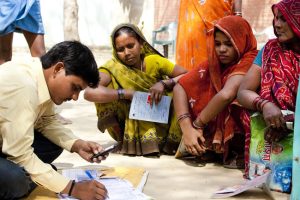09 Nov India ahead of China in Financial Inclusion; Why is Financial Inclusion important ? (GS 3, Economics, The Hindu, Indian Express, RBI)
News/ Context: India is now ahead of China in financial inclusion metrics, with mobile and Internet banking transactions rising to 13,615 per 1,000 adults in 2020 from 183 in 2015 and the number of bank branches inching up to 14.7 per 1 lakh adults in 2020 from 13.6 in 2015, which is higher than in Germany, China and South Africa, as per a SBI report. The report says that the use of digital payments between 2015 and 2020, internet and mobile banking transaction per 1000 adults have increased to 13615 in 2019 from 183 in 2015.
Pradhanmantri Jan Aadhar Yojana along with robust digital infrastructure, since 2014, usage of Banking correspondent model judiciously and recalibration of Bank branches played a very important role in achieving this milestone. It must be noted that financial inclusion policies have a multiplier effect on economic growth, poverty and income inequality reduction, while being promising for financial stability and thus in enhancing the standard of living of common people.
The SBI report has also noted that the states with higher Pradhanmantri Jan Dhan Yojana (PMJDY) account balances have seen a perceptible decline in crime. States with more PMJDY accounts are why accounts are opened, witnessed drop in consumption of intoxicants such as alcohol and tobacco products which is statistically significant and economically meaningful.
Banking correspondent model has also played a very important role in this regard as per the report. Banking correspondent in India is enabled to provide a defined range of banking services at low cost and hence is instrumental in promoting financial inclusion.
“The new branch authorisation policy of 2017 – which recognises BCs that provide banking services for a minimum of 4-hours per day and for at least 5-days a week as banking outlets has progressively obviated the need to set up brick and mortar branches. For example, the number of ‘Banking Outlets in Villages – BCs’ has risen from 34,174 in Mar’10 to 12.4 lakh in Dec’20. Such progress shows an impressive outreach of banking services through branchless banking,” the report said.
What is Financial Inclusion: Financial inclusion may be defined as the process of ensuring access to financial services and timely and adequate credit where needed by vulnerable groups such as weaker sections and low income groups at an affordable cost (The Committee on Financial Inclusion, Chairman: Dr. C. Rangarajan).
Financial Inclusion, broadly defined, refers to universal access to a wide range of financial services at a reasonable cost. These include not only banking products but also other financial services such as insurance and equity products (The Committee on Financial Sector Reforms, Chairman: Dr.Raghuram G. Rajan).
The essence of financial inclusion is to ensure delivery of financial services which include – bank accounts for savings and transactional purposes, low cost credit for productive, personal and other purposes, financial advisory services, insurance facilities (life and non-life) etc.
The Government of India and the Reserve Bank of India have been making concerted efforts to promote financial inclusion as one of the important national objectives of the country. Some of the major efforts made in the last five decades include – nationalization of banks, building up of robust branch network of scheduled commercial banks, co-operatives and regional rural banks, introduction of mandated priority sector lending targets, lead bank scheme, formation of self-help groups, permitting Banking Correspondents/ Banking Facilitators (BCs/BFs) to be appointed by banks to provide doorstep delivery of banking services, zero balance BSBD (Basic Savings Bank Deposit) accounts, etc. The fundamental objective of all these initiatives is to reach the large sections of the hitherto financially excluded Indian population, as Financial Inclusion plays a crucial role in eliminating poverty.
“Overcoming poverty is not a gesture of charity. It is an act of justice. It is the protection of a fundamental human right, the right to dignity and a decent life. While poverty persists, there is no true freedom. Sometimes it falls upon a generation to be great. You can be that great generation. Let your greatness blossom. Of course, the task will not be easy. But not to do this would be a crime against humanity, against which I ask all humanity now to rise up.” ………………Nelson Mandela
“The test of our progress is not whether we add more to the abundance of those who have much; it is whether we provide enough for those who have too little.” – Franklin D. Roosevelt
“Poverty is the worst form of violence.” …………. Mahatma Gandhi
“If the misery of the poor be caused not by the laws of nature, but by our institutions, great is our sin.” ………………….. Charles Darwin
Download CURRENT AFFAIRS 9th November 2021
Plutus IAS Current Affairs Team Member




No Comments